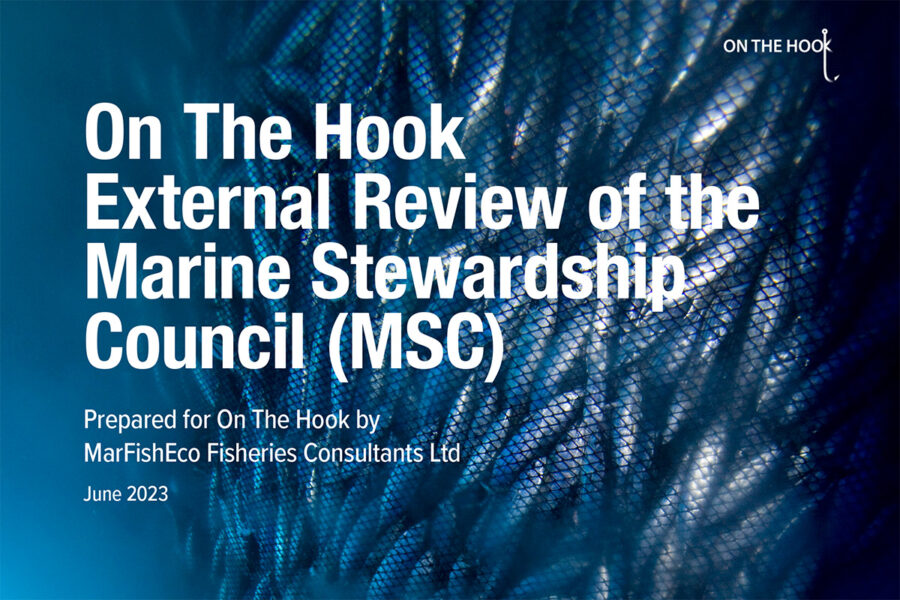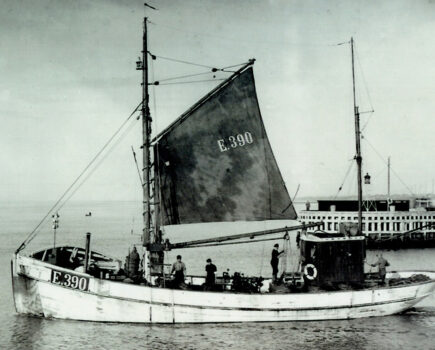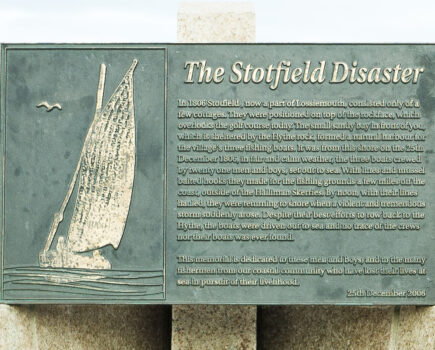On The Hook argues that its external review sets out a route for the Marine Stewardship Council to maintain credibility and effectiveness.
By AMY HAMMOND – On The Hook campaign co-ordinator
Against a backdrop of notable stock collapses – and a clear failure of governments to address the global decline in fish populations – the Marine Stewardship Council (MSC) emerged in the 1990s proposing an alternative, market-based route to sustainability.
Its pitch was that certification would enable certain fisheries to access market advantages, and that this in turn would incentivise others across the industry to improve their practices towards the required standard.
Twenty-five years later, the MSC now certifies around 15% of global wild marine catch. As consumer awareness of sustainability and demand for sustainability guarantees grows – but as marine life nevertheless continues to decline – it feels timely to question whether seafood certification schemes are really delivering what we need from them.
The MSC’s mission of using its ecolabel to recognise and reward sustainable fishing and guide consumer choices has always been a vital one, and its theory of how this could drive overall transformation of the market makes sense on paper. However, the MSC’s certification of damaging fisheries – from Australian orange roughy to Gulf of Maine lobster – as well as its inaccessibility to most small-scale fisheries and its slow pace of change have raised serious questions about how effective it is in practice.
The On The Hook campaign formed in 2017 to put the MSC ‘on the hook’ for certifying unsustainable fisheries, and to urge it to do better. In April 2022, after numerous rejected calls on the MSC to initiate its own independent review, On The Hook launched an external review of the MSC. The intention of this review was both to spark necessary discussion and also to define constructive solutions.
Over the following year, we ran a public online survey, a series of expert roundtable discussions, and several one- to-one interviews with key stakeholders. MarFishEco Ltd then supported us in publishing a report in June 2023 which synthesises feedback from those exercises and, based on that synthesis, offers a series of recommended improvements for the MSC to implement over appropriate timeframes.
The report concludes that respondents largely felt that the MSC had lowered the bar for certification over time, suggesting that its pursuit of growth had been at the expense of effectiveness. The MSC’s certification of numerous unsustainable and harmful large- scale fisheries resulted in many participants in On The Hook’s review feeling that the MSC had lost its credibility as an indicator of sustainable fishing, and that it no longer met the expectations of a leading ecolabel.
The report summarises numerous issues that review participants suggested as contributing to the MSC’s failings as an indicator of ‘sustainability’. These notably included its lack of consideration of human rights, social sustainability or climate impacts of fisheries, alongside the financial conflict of interest inherent in the MSC business model in which fisheries directly select and pay the certification bodies assessing them.
Participants also pointed to the ambiguity of much of the MSC’s Fisheries Standard against which fisheries are assessed. Many felt that this had contributed to slipping standards by creating too much scope for different certification bodies to interpret and apply the Standard inconsistently across fisheries.
Another major issue identified was the MSC’s certification of fisheries with ‘conditions’ – improvements that are required over a five- year period, during which time the fishery is still considered sustainable and permitted to sell catch carrying the ‘certified sustainable seafood’ label.
Finally, On The Hook’s review also identified concerns relating to the MSC’s processes and governance, including its failure to incorporate stakeholder feedback into policy development, its insufficient investment in science, excessive barriers to stakeholders objecting against certifications, and its governance bodies not being representative of the wider global fishing industry and stakeholder community.
It was felt that this lack of representation was echoed by the MSC’s continued inaccessibility by many sustainable small-scale and developing-world fisheries that lack the resources required to engage with its programme.
Based on these findings, the On The Hook report sets out a roadmap of key recommended improvements for the MSC, including adopting a holistic approach to sustainability by incorporating climate change and social considerations, prohibiting the certification of unsustainable fisheries and practices which undermine the credibility of the entire programme, and fixing fundamental weaknesses in its business and operating models.
As Professor Callum Roberts emphasised in his foreword to On The Hook’s review, trust is the MSC’s only asset and one which, once lost, requires considerable clarity, commitment and investment to regain. The MSC can only successfully achieve what is needed from it if it opens itself up to feedback and embraces meaningful reform – but it has yet to engage with our report substantively.
On The Hook’s roadmap clearly outlines the necessary next steps for the MSC – I hope that readers of Fishing News will join us in urging the MSC to start along the path to crucial reform.
FIND OUT MORE
The On the Hook report can be read here.
This story was taken from the latest issue of Fishing News. For more up-to-date and in-depth reports on the UK and Irish commercial fishing sector, subscribe to Fishing News here or buy the latest single issue for just £3.30 here.
Sign up to Fishing News’ FREE e-newsletter here.








